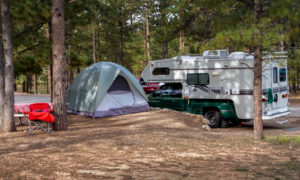
Most RVers take RV Shore Power safety for granted. After all, the power pedestals we installed and wired by licensed electricians right? It’s the law… there are building codes right?
Never be too quick to trust that power outlet.
I once sat and watched as the park ‘maintenance’ man reversed the polarity on the outlet at the next site because the RVer complained he had low voltage.
At another park I got a nice tingle whenever I reach for the door handle of the RV.
You can guard against plugging your RV into an improperly wired power pedestal with a simple, inexpensive polarity checker.
Most common polarity checkers have a standard household 15-amp plug. To test 30-amp or 50-amp outlets you need the appropriate adaptor.
Of course, proper voltage is as important as proper polarity, and you can check that with another inexpensive item.
Check the power outlet for voltage and polarity at your new site before you settle in. That way it won’t be too much trouble to move to another site if there is a problem.
It’s not necessary but if you have a spare outlet in your RV, preferable one you can check easy, leave the voltage meter plugged in to monitor to voltage. During the summer, when everyone is running their air conditioner, the voltage at many parks can drop below the acceptable level.
Related articles on RVbasics.com
- RV Electrical System Basics
- RV Generator FAQs
- Generator – Portable for RV Use
- Using a 50-amp to 30-amp adapter
- Solar Power Kits Provide Electricity for Your RV
- Use the Sun to Power Your RV
- RV Inverter Basics
- How to Choose the Right RV Invertert for Your RV
- RV Inverter Do’s & Don’ts
——————–
The ABCs of RVing eBook
Most guides to RVing overlook the very basic questions newbies have because the authors assume they already know them. But that’s seldom true! The fact is, there is an incredible amount to learn! This ebook from the editors of “Beginners Guide to RVing” answers more than 160 questions that new RVers ask, providing RV newbies a jump start on learning what they need to know to enjoy their RV travels more! To get more info or to purchase… Click Here!







I have a question not a comment. I am plugged into 50 am shore power with my 2013 Entegra Aspire. The shore power also has a regular plug on the post with a GFCI breaker for those two outlets. I lost all shore power and eventually all electric as the inverter lost charge in the middle of the night. After much checking of breakers and fuses, etc, I discovered that the post GFCI breaker was tripped and when I reset it, everything came back on. Isn’t that backward wiring? In a house, the tripped GFCI doesn’t shut down your electrical panel, why would it shut down the main electric in an RV campground.
I am not an electrician so I cannot comment with any authority, however, it sort of makes sense. In a house, the GFCI protects the circuit it is on. In a campground shore power post, your RV would be the ‘circuit’ the GFCI is protecting.